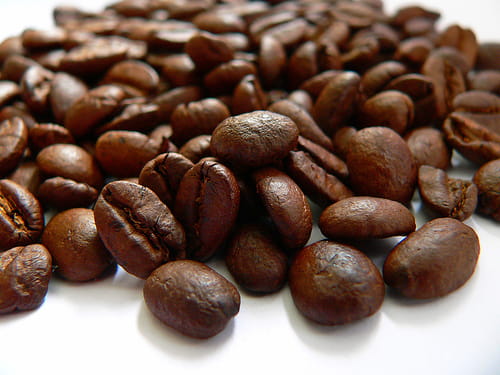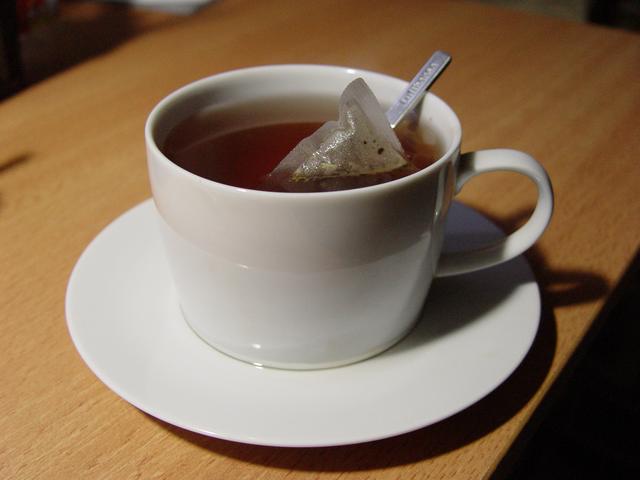How Much Caffeine Is In That?

The Bottom Line
The line between enough caffeine and too much varies from person to person. People who overdo it can experience unpleasant side effects until the caffeine wears off in a few hours. People who take too many caffeine pills to stay awake can have seizures. There have even been some deaths from caffeine overdoses.

The Full Story
An ordinary, old-fashioned cup of coffee has about 60 milligrams (mg) of caffeine. Drink an extra-large hot or cold coffee from the corner coffee shop, add an espresso shot, and you're drinking more than 400 mg of caffeine.
Drink an old-fashioned cup of tea, and you're drinking about 40 mg of caffeine. Make that a giant-sized ice tea and you're multiplying your caffeine intake many times over.
Add a chocolate bar (about 5 - 35 mg of caffeine) and drink a cola (another 40 to 60 mg or more). How about a "black coffee shot" added to your convenience store coffee? An energy ball from what looks like a gum ball machine? Would you like that chocolate-flavored? How about an energy drink? Energy pills? Even some over-the-counter headache remedies contain caffeine.
It's easy to swallow enough caffeine to make your hands shake and your heart pound. Your stomach might be upset and you definitely can be irritable and have trouble sleeping. If you miss your usual morning cup or mug, you could have a headache from caffeine withdrawal.
Caffeine is hard to avoid because it's found in so many common foods and drinks. Even decaffeinated coffee or tea usually contains a small amount of caffeine. In moderate amounts, caffeine is not harmful to most people. It can increase alertness, help you concentrate, and maintain energy.
The line between enough and too much varies from person to person. Many people can manage and enjoy the amount of caffeine in about three cups of coffee daily. But people who overdo it can experience unpleasant side effects until the caffeine wears off in a few hours. People who take too many caffeine pills to stay awake can have seizures. There have even been some deaths from caffeine overdoses.
If you have symptoms of a caffeine overdose, use the webPOISONCONTROL® online tool for guidance or call Poison Control right away at 1-800-222-1222. You will be asked for the amount of caffeine you've taken in and about your overall health. Then, you will receive specific instructions about what to do. Most cases of mild symptoms can be managed at home with Poison Control's guidance. If it might be enough to cause problems, Poison Control will work with paramedics and emergency room staff to see that you get the needed care.
Rose Ann Gould Soloway, RN, BSN, MSEd, DABAT emerita
Clinical Toxicologist
Poisoned?
Call 1-800-222-1222 or
Prevention Tips
Be aware of how much caffeine you're taking in with beverages, foods, and medications. It's easy to swallow enough caffeine to make your hands shake and your heart pound.
This Really Happened
Case 1: An 18-year-old male college student wanted to stay up all night and party with his friends. He put some caffeine powder into a non-alcoholic drink and swallowed it at 2:30 AM. Shortly afterwards he started vomiting, once so hard that he threw up some blood. Hours later he called 911 and was found to have a fast heart rate. In the emergency room, he had ventricular tachycardia (a fast heart rhythm that can lead to death), but his heart returned to a normal beat. The patient also had a headache. A specialist at Poison Control advised at least another 15 hours of hospital observation due to the length of time caffeine stays in the body. The patient was admitted to the hospital on a cardiac monitor. His heart rate remained normal and he had no further rhythm problems. Thirty-two hours after the caffeine ingestion he was released from the hospital.
Case 2: A 23-year-old woman was taking a diet aid she purchased over the internet for weight loss. This product contained a high amount of caffeine per capsule in the form of coffee bean extract and green tea extract, as well as cayenne pepper and yohimbe bark extract (a stimulant that may raise the heart rate and blood pressure), among other ingredients. The label instructions said to take one capsule daily but she admitted to taking three capsules every day for an unknown period of time. She went to the emergency room complaining of leg numbness and tingling. She had last taken the product about 12 hours before. The emergency physician believed her symptoms were related to excessive caffeine intake. She recovered by discontinuing the diet aid.
For More Information
Caffeine overdose (National Library of Medicine)
References
Pelchovitz DJ, Goldberger JJ. Caffeine and cardiac arrhythmias: a review of the evidence. The American Journal of Medicine. 2011;124:284-289.Poisoned?
Call 1-800-222-1222 or
Prevention Tips
Be aware of how much caffeine you're taking in with beverages, foods, and medications. It's easy to swallow enough caffeine to make your hands shake and your heart pound.
This Really Happened
Case 1: An 18-year-old male college student wanted to stay up all night and party with his friends. He put some caffeine powder into a non-alcoholic drink and swallowed it at 2:30 AM. Shortly afterwards he started vomiting, once so hard that he threw up some blood. Hours later he called 911 and was found to have a fast heart rate. In the emergency room, he had ventricular tachycardia (a fast heart rhythm that can lead to death), but his heart returned to a normal beat. The patient also had a headache. A specialist at Poison Control advised at least another 15 hours of hospital observation due to the length of time caffeine stays in the body. The patient was admitted to the hospital on a cardiac monitor. His heart rate remained normal and he had no further rhythm problems. Thirty-two hours after the caffeine ingestion he was released from the hospital.
Case 2: A 23-year-old woman was taking a diet aid she purchased over the internet for weight loss. This product contained a high amount of caffeine per capsule in the form of coffee bean extract and green tea extract, as well as cayenne pepper and yohimbe bark extract (a stimulant that may raise the heart rate and blood pressure), among other ingredients. The label instructions said to take one capsule daily but she admitted to taking three capsules every day for an unknown period of time. She went to the emergency room complaining of leg numbness and tingling. She had last taken the product about 12 hours before. The emergency physician believed her symptoms were related to excessive caffeine intake. She recovered by discontinuing the diet aid.
